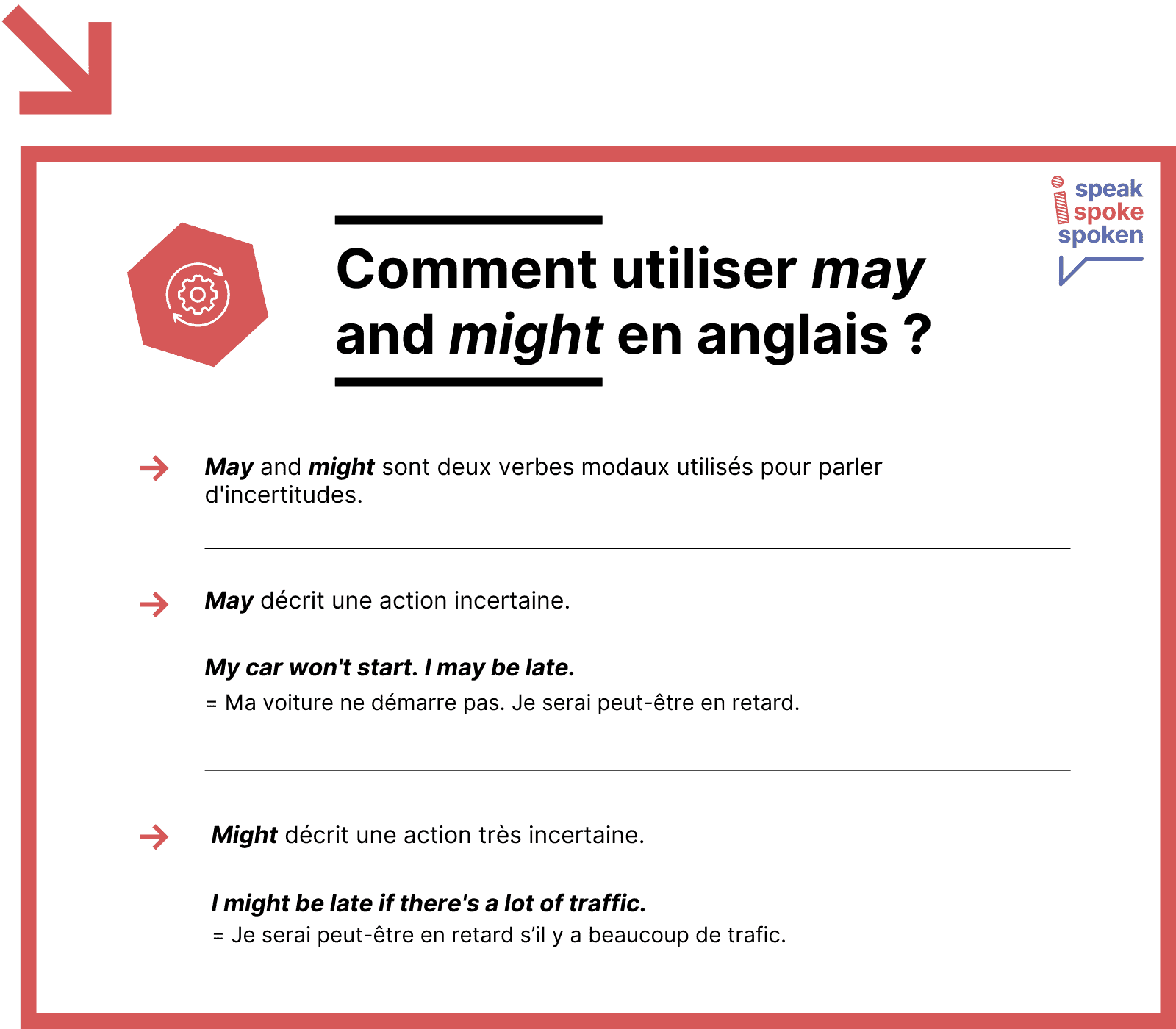May y Might son dos verbos modales que se utilizan principalmente para expresar incertidumbre en el presente o en el futuro. Como todos los verbos modales, son invariables y siempre van seguidos de una base verbal.
Índice →
La diferencia entre may y might en presente
La principal diferencia entre may y might es el grado de incertidumbre. La probabilidad de que se produzca una acción es mayor con may que con might.
| Grado | Inglés | Español | Audio |
|---|---|---|---|
| Incierto | It may rain later. | Puede que llueva más tarde. | |
| Muy incierto | It might rain tonight. | Puede que llueva esta noche. | |
| Incierto | My car won’t start. I may be late. | Mi coche no arranca. Puede que llegue tarde. | |
| Muy incierto | I might be late if there’s a lot of traffic. | Puede que llegue tarde si hay mucho tráfico. |
May y might con tiempos pasados
Para expresar incertidumbre en pasado, solo se utiliza might que es la forma pasada de may y no importa cuál sea el grado de probabilidad:
| Inglés | Fonética | Español | Audio |
|---|---|---|---|
| She hadn’t slept much. I thought she might be tired. | ʃi ˈhædənt slɛpt mʌʧ aɪ θɔt ʃi maɪt bi ˈtaɪərd | No había dormido mucho. Pensé que debía estar cansada. | |
| I think I may go to the game. | aɪ θɪŋk aɪ meɪ goʊ tu ðə geɪm | Creo que puedo ir al partido. | |
| I thought I might go to the game. | aɪ θɔt aɪ maɪt goʊ tu ðə geɪm | Pensé que podría ir al partido. |
May y might con la forma perfect
Cuando se pregunte por un acontecimiento pasado, se puede utilizar may y might en el tiempo perfect.
| Inglés | Fonética | Español | Audio |
|---|---|---|---|
| Jenny seems stressed. She might have lost her keys. | ˈʤɛni simz strɛst ʃi maɪt hæv lɔst hɜr kiz | Jenny parece estresada. A lo mejor ha perdido las llaves. | |
| When Bill arrives, he may have already eaten. | wɛn bɪl əˈraɪvz hi meɪ hæv ɔlˈrɛdi ˈitən | Cuando Bill llegue, puede que ya haya comido. |
Otros usos específicos de may y might
- Utilizamos may para pedir permiso educadamente o para dar permiso (o no) para hacer algo.
- Para expresar un deseo, utilizamos may y no might.
| Inglés | Fonética | Español | Audio |
|---|---|---|---|
| May I park in front of the main entrance? | meɪ aɪ pɑrk ɪn frʌnt ʌv ðə meɪn ˈɛntrəns | ¿Puedo aparcar delante de la entrada principal? | |
| No Sir. Unfortunately you may not. | noʊ sɜr ənˈfɔrʧənətli ju meɪ nɑt | No, señor. Desgraciadamente, esto no es posible. | |
| Visitors may not take photographs inside the museum. | ˈvɪzətərz meɪ nɑt teɪk ˈfoʊtəˌgræfs ɪnˈsaɪd ðə mjuˈziəm | Los visitantes no pueden hacer fotografías en el museo. | |
| May your wish come true! | meɪ jʊər wɪʃ kʌm tru | ¡Que tu deseo se haga realidad! | |
| May you enjoy your future career. | meɪ ju ɛnˈʤɔɪ jʊər ˈfjuʧər kəˈrɪr | Disfruta de tu futuro profesional. |
En resumen

Ejercicio sobre la diferencia entre may y might
Completa con MAY o MIGHT.
1/ Sir, you ______ come in.
2/ I thought I ______ win the game.
3/ ______ their dreams come true!
4/ The sky is so heavy. I think it ______ rain.
5/ I ______ come, but I don’t really feel like it.
Respuestas:
1/ Sir, you may come in.
Señor, puede entrar.
2/ I thought I might win the game.
Pensé que podía ganar el partido.
3/ May their dreams come true!
¡Que sus sueños se hagan realidad!
4/ The sky is so heavy. I think it may rain.
El cielo está muy cargado. Creo que va a llover. (alta probabilidad)
5/ I might come, but I don’t really feel like it.
Podría ir, pero no me apetece mucho. (baja probabilidad)


